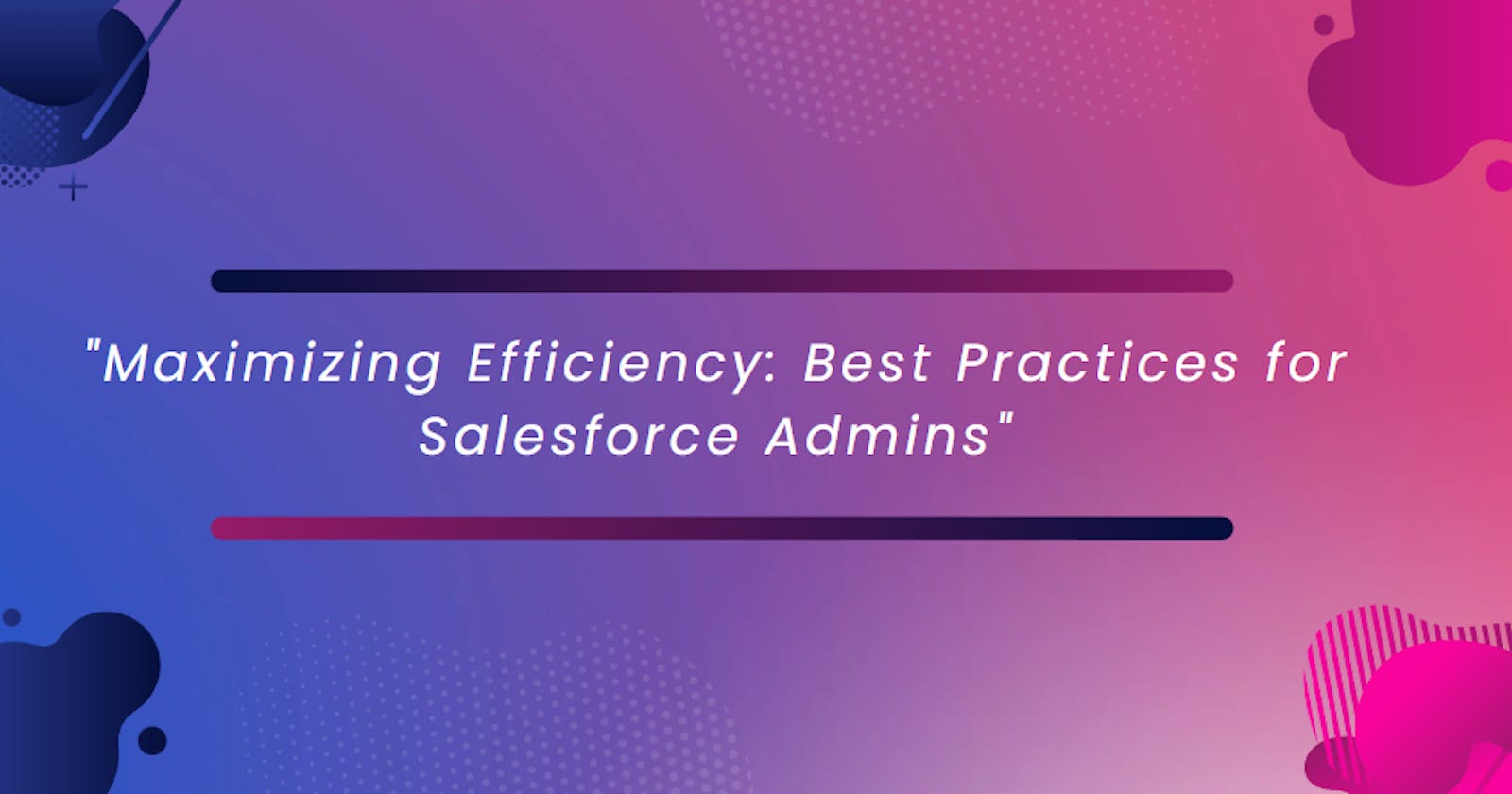Maximizing Efficiency: Salesforce Admin Best Practices
Best Practices for Salesforce Admins for maximizing efficiency
Salesforce has revolutionized the way businesses manage customer relationships and streamline their processes. Central to the success of any Salesforce implementation is a skilled and efficient Salesforce Admin. A Salesforce Admin is responsible for configuring, customizing, and maintaining the platform to meet the unique needs of the organization. In this article, we will explore the best practices that Salesforce Admins can follow to maximize efficiency and productivity within the Salesforce ecosystem.
Understanding the Role of a Salesforce Admin
A Salesforce Admin is not just a technical expert but also a strategic thinker. They bridge the gap between the technical and business aspects of Salesforce, understanding the needs of various stakeholders and translating them into practical solutions. By maintaining a clear understanding of the company's goals and objectives, a Salesforce Admin can align the platform to drive optimal results.
Setting Up Salesforce for Efficiency
Configuring User Permissions
A crucial aspect of Salesforce setup is managing user permissions. Admins should ensure that each user has access only to the data and features they need for their role. By setting up well-defined profiles and permission sets, admins can prevent data leaks and maintain data integrity.
Customizing Page Layouts
Salesforce offers highly customizable page layouts that allow admins to organize fields and related lists to suit their specific processes. By tailoring the page layouts to match user workflows, the admin can enhance user experience and streamline data entry.
Utilizing Standard and Custom Objects
Salesforce comes with a wide range of standard objects, such as accounts, contacts, and opportunities. Admins should leverage these objects as much as possible to take advantage of built-in functionalities. Additionally, for unique business requirements, custom objects can be created to capture specialized data.
Data Management and Organization
Data Import and Deduplication
Maintaining clean and accurate data is essential for any Salesforce instance. Admins should establish data import best practices to prevent duplicate records and ensure that data is correctly mapped during the import process. Regular data deduplication should also be performed to eliminate redundancy.
Data Validation Rules and Workflows
Implementing data validation rules and workflows can significantly enhance data quality and consistency. Validation rules help prevent erroneous data entry, while workflows automate repetitive tasks, reducing manual effort and potential errors.
Automating Processes with Workflows and Process Builder
One of the primary objectives of a Salesforce Admin is to automate processes wherever possible. Workflows and Process Builder allow admins to define triggers and actions that execute automatically based on predefined criteria. By automating repetitive tasks, admins can save time and focus on more strategic initiatives.
Leveraging Salesforce Reports and Dashboards
Salesforce offers robust reporting and dashboard capabilities that provide valuable insights into business performance. Admins should create customized reports and dashboards to monitor key metrics and identify trends, empowering decision-making at all levels of the organization.
Salesforce Security Best Practices
User Authentication and Access Control
Ensuring the security of sensitive data is paramount for any organization. Salesforce Admins should enforce strong user authentication methods, such as multi-factor authentication, to prevent unauthorized access.
Data Encryption
Data encryption adds an extra layer of protection to sensitive information. Admins should enable encryption for sensitive fields to safeguard critical data.
Maximizing Efficiency with AppExchange Apps
Time-Saving Apps for Admins
The Salesforce AppExchange offers a vast array of apps designed to enhance productivity for admins. These apps can automate various tasks, simplify data management, and improve overall efficiency.
AppExchange Integration
Integrating Salesforce with other business-critical applications through the AppExchange can streamline processes and eliminate manual data entry, resulting in increased efficiency.
Handling Salesforce Updates and Releases
Salesforce regularly releases updates and new features. Admins should stay informed about these updates and conduct thorough testing to ensure a smooth transition without disrupting existing processes.
Continuous Learning and Skill Development for Admins
The Salesforce platform evolves constantly, and so should the skills of Salesforce Admins. Engaging in regular training and certification programs keeps admins up-to-date with the latest functionalities and best practices.
Conclusion
Salesforce Admins play a pivotal role in maximizing the potential of the Salesforce platform. By following the best practices outlined in this article, admins can efficiently configure, maintain, and optimize Salesforce to meet their organization's unique needs. Embracing automation, data management, security measures, and continuous learning will empower admins to unlock the full potential of Salesforce.
FAQs
What qualifications does a Salesforce Admin need?
To become a Salesforce Admin, one should have a good understanding of Salesforce functionalities and the ability to customize the platform according to business requirements. Earning Salesforce certifications can enhance credibility.
Can Salesforce Admins create custom applications?
Yes, Salesforce Admins can build custom applications using the Salesforce platform's declarative tools without writing any code.
How often should data deduplication be performed?
Data deduplication should be performed regularly, ideally as part of routine data maintenance, to ensure data accuracy and cleanliness.
Are AppExchange apps safe to use?
Salesforce thoroughly reviews and vets apps before listing them on the AppExchange, ensuring that they meet security and performance standards.
What is the benefit of integrating Salesforce with other applications?
Integration with other applications eliminates data silos, streamlines processes, and provides a unified view of customer data, resulting in increased efficiency and improved decision-making.
